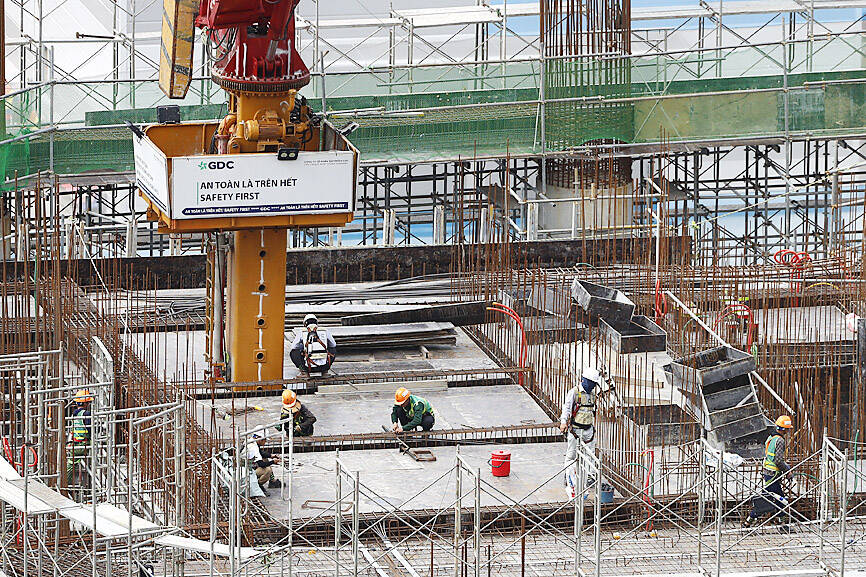Vietnam has missed out on multibillion-dollar investments by multinationals including Intel Corp and LG Chem Ltd because it lacks sufficient investment incentives, the Vietnamese Ministry of Planning and Investment said in a document reviewed by Reuters.
US chipmaker Intel had proposed to invest US$3.3 billion in a project in Vietnam and asked the country for “cash support” of 15 percent, but later decided to move the project to Poland, the ministry said in the document dated on June 29.
South Korea’s LG Chem also skipped Vietnam to invest in a battery project in Indonesia, after having asked the Vietnamese government to cover 30 percent of the investment cost, the document said.

Photo: EPA-EFE
“Recently, many large groups have come to explore investment opportunities in Vietnam, but have later decided to move to other countries as Vietnam lacks regulations on investment supports,” the document said.
Vietnam, which is an important manufacturing base for companies such as Samsung Electronics Co, Foxconn Technology Group (富士康科技集團) and Intel, is heavily reliant on foreign investment for growth. Companies with foreign investment account for about 70 percent of its total exports.
The ministry document also showed that Intel had shelved a planned investment in Vietnam that could have nearly doubled the US chipmaker’s operation in the Southeast Asian country.
The document added that Austria-based semiconductor manufacturer AT&S had decided to invest in Malaysia after its request for investment support in Vietnam was not met.
Samsung was also planning to move some production to India, the document said.
Multinationals have been watching Vietnam's plans to set up the investment incentive fund after the country's parliament last year approved the OECD-led global minimum corporate tax rate of 15 percent, raising the effective tax level paid by companies.
Nonetheless, Vietnam’s economic growth is accelerating and could meet or exceed the government’s 6.5 percent target this year, Minister of Planning and Investment Nguyen Chi Dung said.
Dung said economic expansion might reach 7 percent this year as improving industrial and construction sectors drive growth, a government statement said.
The IMF has forecast Vietnam’s GDP to expand 6 percent this year, up from 5 percent last year — a pace that would make it among Asia’s fastest-growing economies.
The economy is also benefiting from increasing exports and foreign direct investment (FDI), Dung said.
Pledged FDI for the year might reach US$39 billion to US$40 billion, up from last year, Deputy Minister of Planning and Investment Tran Quoc Phuong said.
The country posted pledged FDI at US$36.6 billion as of December last year.
Additional reporting by BloomberG

Taiwan Semiconductor Manufacturing Co (TSMC, 台積電) yesterday said that its investment plan in Arizona is going according to schedule, following a local media report claiming that the company is planning to break ground on its third wafer fab in the US in June. In a statement, TSMC said it does not comment on market speculation, but that its investments in Arizona are proceeding well. TSMC is investing more than US$65 billion in Arizona to build three advanced wafer fabs. The first one has started production using the 4-nanometer (nm) process, while the second one would start mass production using the

A TAIWAN DEAL: TSMC is in early talks to fully operate Intel’s US semiconductor factories in a deal first raised by Trump officials, but Intel’s interest is uncertain Broadcom Inc has had informal talks with its advisers about making a bid for Intel Corp’s chip-design and marketing business, the Wall Street Journal reported, citing people familiar with the matter. Nothing has been submitted to Intel and Broadcom could decide not to pursue a deal, according to the Journal. Bloomberg News earlier reported that Taiwan Semiconductor Manufacturing Co (TSMC, 台積電) is in early talks for a controlling stake in Intel’s factories at the request of officials at US President Donald Trump’s administration, as the president looks to boost US manufacturing and maintain the country’s leadership in critical technologies. Trump officials raised the

‘SILVER LINING’: Although the news caused TSMC to fall on the local market, an analyst said that as tariffs are not set to go into effect until April, there is still time for negotiations US President Donald Trump on Tuesday said that he would likely impose tariffs on semiconductor, automobile and pharmaceutical imports of about 25 percent, with an announcement coming as soon as April 2 in a move that would represent a dramatic widening of the US leader’s trade war. “I probably will tell you that on April 2, but it’ll be in the neighborhood of 25 percent,” Trump told reporters at his Mar-a-Lago club when asked about his plan for auto tariffs. Asked about similar levies on pharmaceutical drugs and semiconductors, the president said that “it’ll be 25 percent and higher, and it’ll

CHIP BOOM: Revenue for the semiconductor industry is set to reach US$1 trillion by 2032, opening up opportunities for the chip pacakging and testing company, it said ASE Technology Holding Co (日月光投控), the world’s largest provider of outsourced semiconductor assembly and test (OSAT) services, yesterday launched a new advanced manufacturing facility in Penang, Malaysia, aiming to meet growing demand for emerging technologies such as generative artificial intelligence (AI) applications. The US$300 million facility is a critical step in expanding ASE’s global footprint, offering an alternative for customers from the US, Europe, Japan, South Korea and China to assemble and test chips outside of Taiwan amid efforts to diversify supply chains. The plant, the company’s fifth in Malaysia, is part of a strategic expansion plan that would more than triple